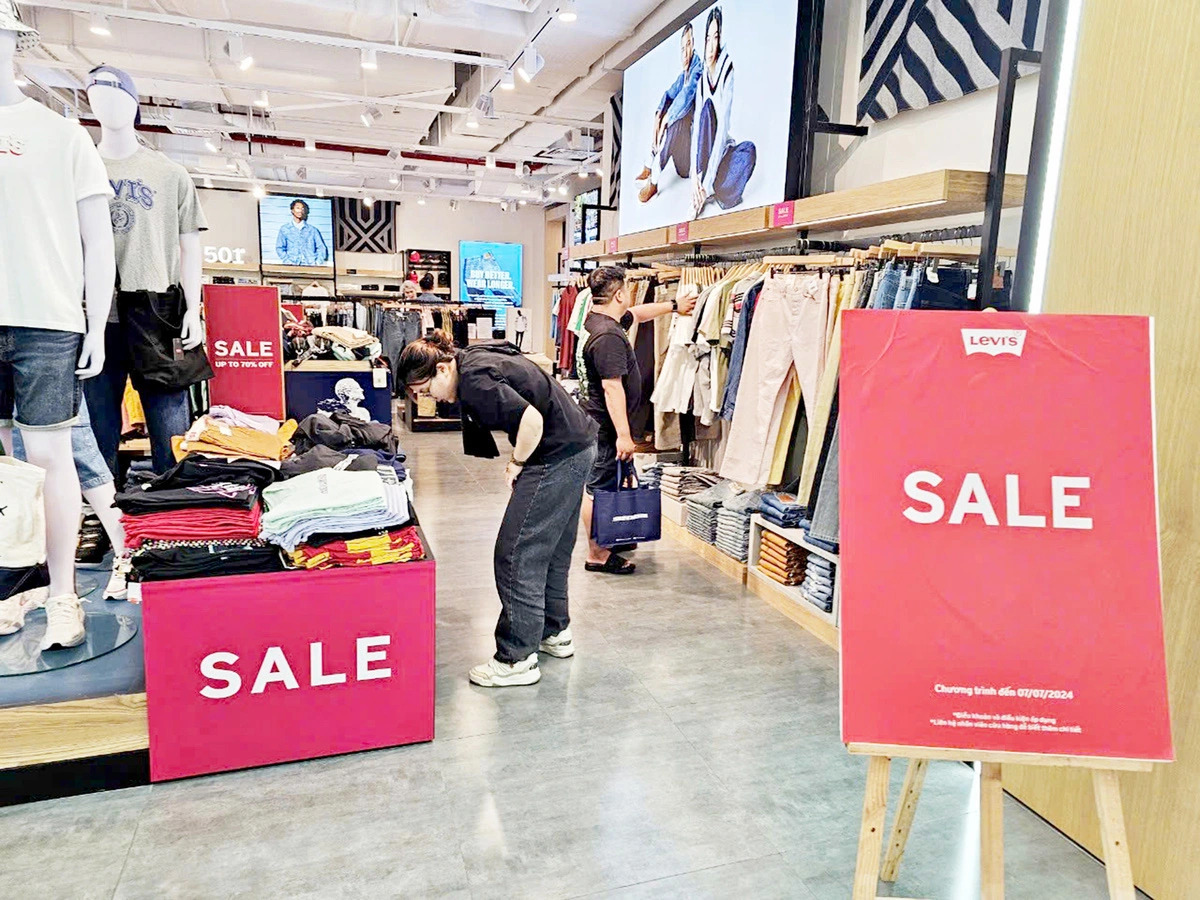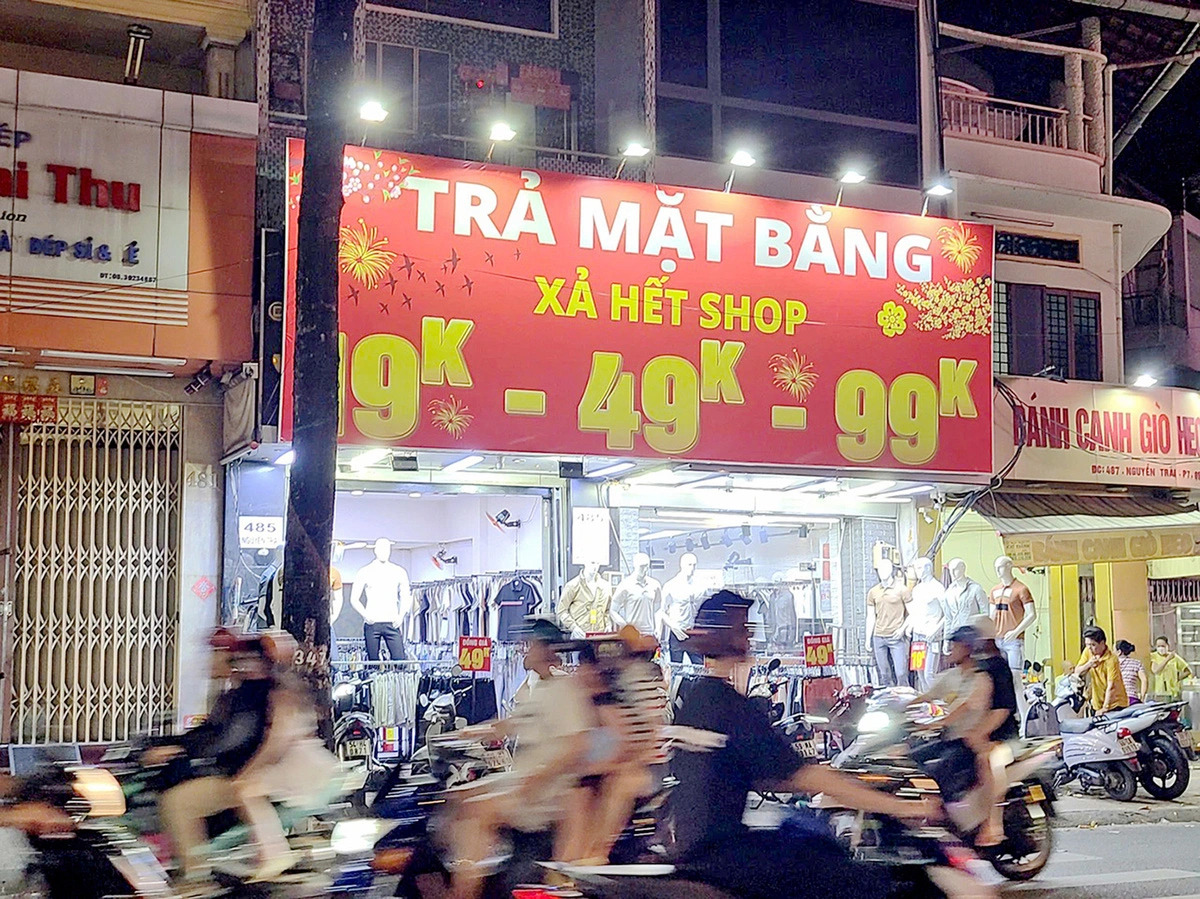As the year-end shopping season heats up, foreign apparel brands continue to thrive in Vietnam, leaving domestic fashion labels grappling with fierce competition, financial constraints, and the influx of affordable, trend-driven imports.
Experts have cited a combination of factors, including product variety, pricing, and the financial power of international brands, as key drivers behind this shift.
Iconic shopping streets in Ho Chi Minh City, such as Nguyen Trai in District 1, Quang Trung in Go Vap District, and Le Van Sy in District 3, once bustling with Vietnamese fashion stores, now showcase empty storefronts or shuttered signs.
Similarly, major wholesale markets like Hanh Thong Tay and Tan Binh, previously hubs for affordable local clothing, are increasingly dominated by Chinese imports.
Ngo Thi Dat, who has retailed at Hanh Thong Tay Market in Go Vap District for over a decade, explained that while some consumers hesitate to purchase Chinese products, their affordability and variety make them irresistible.
As a result, 70-90 percent of the market's offerings, including shoes, clothing, and accessories, are from China.
"Chinese accessories like hair clips cost only VND1,000-2,000 [US$0.04-0.08], and clothing or shoes can be priced as low as tens of thousands of dong, so it’s no surprise they’re so widespread," said Dat.
Even established Vietnamese brands are scaling back their operations.
Lep’, once known for its iconic floral dresses, was closed permanently last month after eight years in service.
Another notable name, CATSA, has shut down all 22 of its stores after 13 years of operation.
Popular Vietnamese brands like IVY Moda and Giian have also reduced their presence, with the former discontinuing its IVY Men line after just five years.
In 2010, Vietnamese fashion boomed with brands like The Blues, Canifa, PT2000, Nem, Elise, and IVY Moda dominating major streets in Hanoi and Ho Chi Minh City.
Over a decade later, many of these have faded into obscurity.
The struggle extends beyond traditional retail outlets, as Vietnamese fashion brands are also losing ground on e-commerce platforms.
According to Metric’s third-quarter 2024 report, Chinese budget fashion brand Lovito has emerged as a leader in Vietnam's online fashion market, boasting a 517 percent year-on-year growth rate.
Lovito taps into seasonal trends to attract young consumers, while offering incredibly affordable items such as shirts starting at VND50,000 ($2) and dresses priced between VND100,000 ($3.95) and VND200,000 ($7.89), with flash sales that feature items as low as VND16,000 ($0.63).
Meanwhile, foreign brands like H&M, Zara, and Uniqlo are claiming prime spaces in Vietnam's leading shopping malls such as Vincom Dong Khoi, Takashimaya, and Saigon Centre in downtown Ho Chi Minh City.
These global giants leverage financial strength, flexible pricing, and diverse designs to expand their presence.
They also run aggressive promotional campaigns, offering steep discounts during major sales events like Black Friday and Singles’ Day (November 11), with some brands slashing prices by up to 90 percent.
|
|
| Several Vietnamese fashion brands are struggling and exiting the market during the peak year-end season. Photo: Nhat Xuan / Tuoi Tre |
A representative from an international fashion brand shared that they often provide discounts with minimal or no profit initially to aggressively market the brand and foster customer loyalty.
“While the fashion industry is challenging, a solid strategy can lead to substantial profits,” said the representative.
Uniqlo, a subsidiary of Japan’s Fast Retailing known for its high-quality, affordable casual wear, exemplifies this strategy.
The brand has opened 26 stores across Vietnam, all in prime locations.
Its latest store, Uniqlo Parc Mall, opened earlier this month in one of Ho Chi Minh City’s largest malls, which houses over 130 global fashion brands.
The brand consistently rolls out promotions and engages in sophisticated marketing to strengthen its presence in the Vietnamese market.
Similarly, TokyoLife, a retailer that sells a wide range of products including fashion, cosmetics, and home goods, has expanded rapidly across Vietnam with 39 stores in Hanoi and nine each in Hai Phong City and Quang Ninh Province in northern Vietnam.
According to staff members, while it markets itself as a Vietnamese brand, it strategically mixes domestically produced and imported goods, including Japanese-sourced cosmetics and beauty products, and household items and plastics from other countries, including China.
To ‘win over customers,’ TokyoLife frequently runs discount programs.
For instance, during Black Friday, it offers up to 50 percent off on a wide range of products across most categories and free shipping for orders over VND279,000 ($11).
Despite concerns over quality, many Vietnamese consumers are drawn to Chinese products for their affordability and variety.
Linh Chi, a 24-year-old in Go Vap District, Ho Chi Minh City, shared that she often shops for Chinese fashion online, attracted by the low prices and diverse designs, even though the quality can be inconsistent.
"The low prices and trendy designs make it hard to resist," she said, explaining that although some items are poorly made, the fashionable styles bring her back for more.
Pham Thi Duong, another shopper from District 3, Ho Chi Minh City, echoed this sentiment, expressing her admiration for Lovito's trendy blouses and unbeatable prices.
Discussing the matter, Pham Van Viet, vice-president of the Ho Chi Minh City Textile Association, highlighted China’s competitive advantage as the ‘global factory,’ capable of mass-producing goods using advanced technology and offering deep discounts that help capture the market.
In contrast, Vietnamese brands often rely on longer production of two to three months and lack flexibility.
Daniel Chan, founder of Intereras, a company facilitating international trade in the textile and garment industry, noted that Chinese brands use AI and big data to optimize production and retail, allowing them to quickly adapt to trends and maintain low inventory.
Nguyen Van Khanh, vice-president of the Ho Chi Minh City Leather and Footwear Association, cited the financial challenges Vietnamese brands face, pointing out that limited resources often lead to early losses and potential bankruptcy.
“Vietnamese brands, with weaker financial backing, face challenges and may eventually close down,” Khanh said, noting that the fashion industry requires significant capital to scale.
Experts agree the market has not seen significant growth due to ongoing economic challenges, while competition has intensified as the numbers of sellers and products increase.
Foreign companies are capturing a larger share of the market, leading to the shrinking presence of local brands.
Experts suggest that Vietnamese brands should focus on niche markets, seek investment from larger investors, or become distributors for established brands.
"Niche markets can specialize in a particular type of clothing or footwear that other producers have not heavily invested in,” said Ngo Van Dong, owner of Van Dong Garment Factory in Thu Duc City under Ho Chi Minh City.
“While the customer base may not be large, the advantage is less competition," he added.
Like us on Facebook or follow us on Twitter to get the latest news about Vietnam!


















































